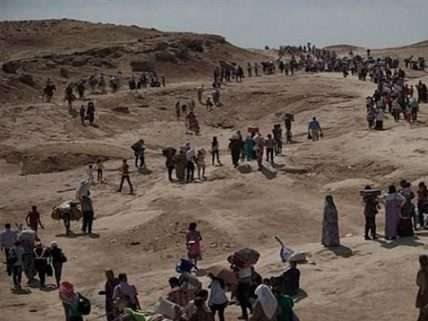Should the US Intervene to Stop a Genocide in Iraq?
No easy answer

Since overrunning large swaths of Iraq in the last two months, the Islamic State of Iraq and the Levant (ISIL) has rebranded itself a caliphate, declared its megalomaniacal leader Abu Bakr al-Baghdadi a caliph of all Muslims, and set about enforcing a Medieval form of Islamic jurisprudence. ISIL has warned non-Muslims in territories under its control that they must pay a steep fine, convert to Islam, leave the country, or face death.
The minority Yazidis, meanwhile, aren't even afforded those limited options extended to other non-Muslims. A pre-Islamic faith rooted in Zoroastrianism, ISIL consider the Yazidis "devil worshippers" worthy of death. Tens of thousands are currently holed up on Sinjar Mountain, surrounded by ISIL fighters ready to kill them. Yesterday, the United States began airdropping humanitarian supplies to civilians and in the evening President Obama announced limited airstrikes against ISIL, something he left the door open for when he spoke about Iraq in June.
In 2011, when President Obama and the interventionists in his cabinet rushed head first into a civil war that had erupted in Libya, they pointed to a potential genocide being perpetrated by Col. Qaddafi against his own people and cited the so-called "responsibility to protect" to justify the intervention. President Obama neither sought, nor received, congressional approval for the military action. Instead, he pointed to the approval of the United Nations, via a Security Council resolution authorizing a no-fly zone and calling for all necessary measures to protect Libyan civilians, and the Arab League, which asked for the no-fly zone, to defend his actions.
In an address to the nation a few days after the U.S.-backed intervention in Libya began the president explained that "responding to natural disasters, for example; or preventing genocide and keeping the peace; ensuring regional security, and maintaining the flow of commerce" are things that involve American interests and values even when they don't directly threat Americans' safety.
It's an easily falsifiable statement—while the U.S. military is regularly involved in disaster relief efforts around the world, there are plenty of instances of disruptions in regional security and the flow of commerce, and even genocide, that don't provoke U.S. interventions. Notably, when President Obama tried to effect a U.S. intervention in Syria, the red line was the use of chemical weapons on civilians and not broader early warning signs of genocide. At any given moment there are a number of armed conflicts around the world that threaten regional stability and even genocide. Mass slaughter has been a recurring leitmotif in modern wars. For the U.S. to be involved in every one would require it to be a world's police force like the one envisioned at the Yalta conference in World War II. Although the U.S. is a serial interventionist in foreign affairs, it's far from a world police force. Yet there are currently U.S. military personnel in more than 150 countries on six continents (PDF). Military advisors in East Africa are helping hunt Joseph Kony and his Lord's Resistance Army while in West Africa advisors are helping in the campaign against Boko Haram in Nigeria. There are even 750 military personnel in Iraq, sent in June when ISIL first began making its massive gains.
Whether or not the United States is a world police force, Iraq was a spectacular own-goal. The U.S. toppled a stable, if unsavory, regime in Iraq, one that was certainly criminal but not uniquely so. The government it left behind has been more interested in consolidating partisan power than building a state and, despite significant U.S. military resources expended there, the Iraqi military has been unable to stem the advance of ISIL, which is now threatening a greater humanitarian crisis than any Saddam Hussein could have mustered in the 21st century.
A senior U.N. official has characterized the ISIL campaign against the Yazidis a genocide. ISIL threatens to further destabilize an already chaotic Middle East. As Sen. Rand Paul (R-Ky.) rightly noted in June, President George W. Bush and his war in Iraq is at least partly responsible for the current unrest in the Middle East. Although ISIL metastasized in a collapsing Syria, the Al-Qaeda linked militants first found a foothold in Iraq during and after the U.S. war there. While the U.S. appears unwilling to accept refugees fleeing violence fueled by the U.S. drug war in Central America, the French have offered asylum to Iraq's Christian refugees, refugees of a U.S.-manufactured crisis, one the French government in fact strongly opposed. The U.S. hasn't announced any policy to aid Iraqi refugees, either.
As a murderous regime intent on dragging the Middle East back into the Dark Ages makes advances in the region, it's worth remembering how governments there have encouraged virulent strains of extremist Islam as a way to maintain their own power. If the U.S. were to intervene to defeat ISIL, it would almost certainly cause more harm than good. Yet with ISIL hunting down minorities in Iraq and the Iraqi government powerless to do anything to stop them, the question of whether the U.S. ought to intervene to protect those civilians from ISIL and a situation U.S. policy helped create is a harder one to answer. President Obama's decision to order limited air strikes in this situation may not be the wrong call. But, given the last half century of U.S. war policy, he will certainly bypass Congress despite claiming to "consult" it. Making the decision unilaterally, outside the constitutional framework, will be the wrong call.

Show Comments (183)